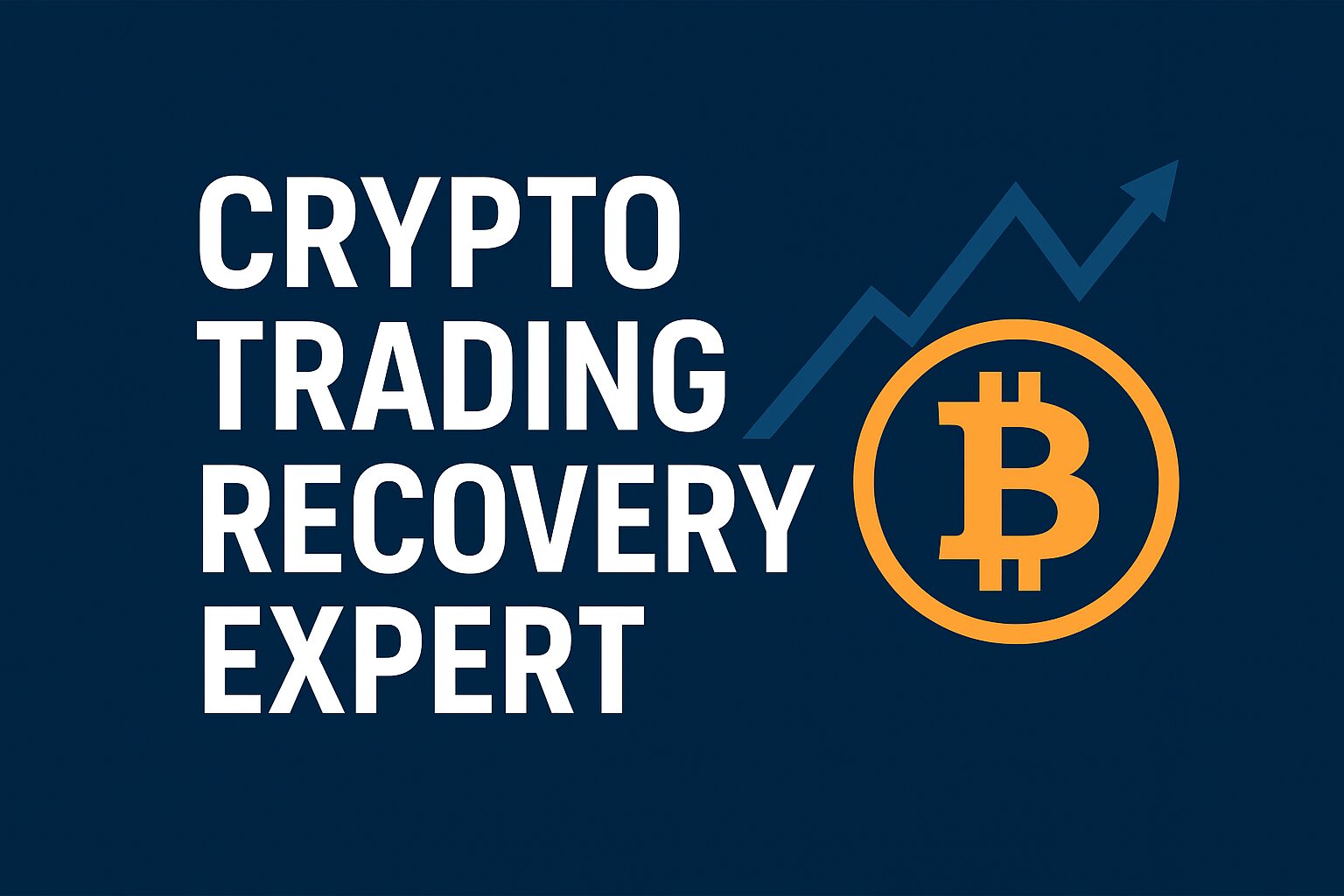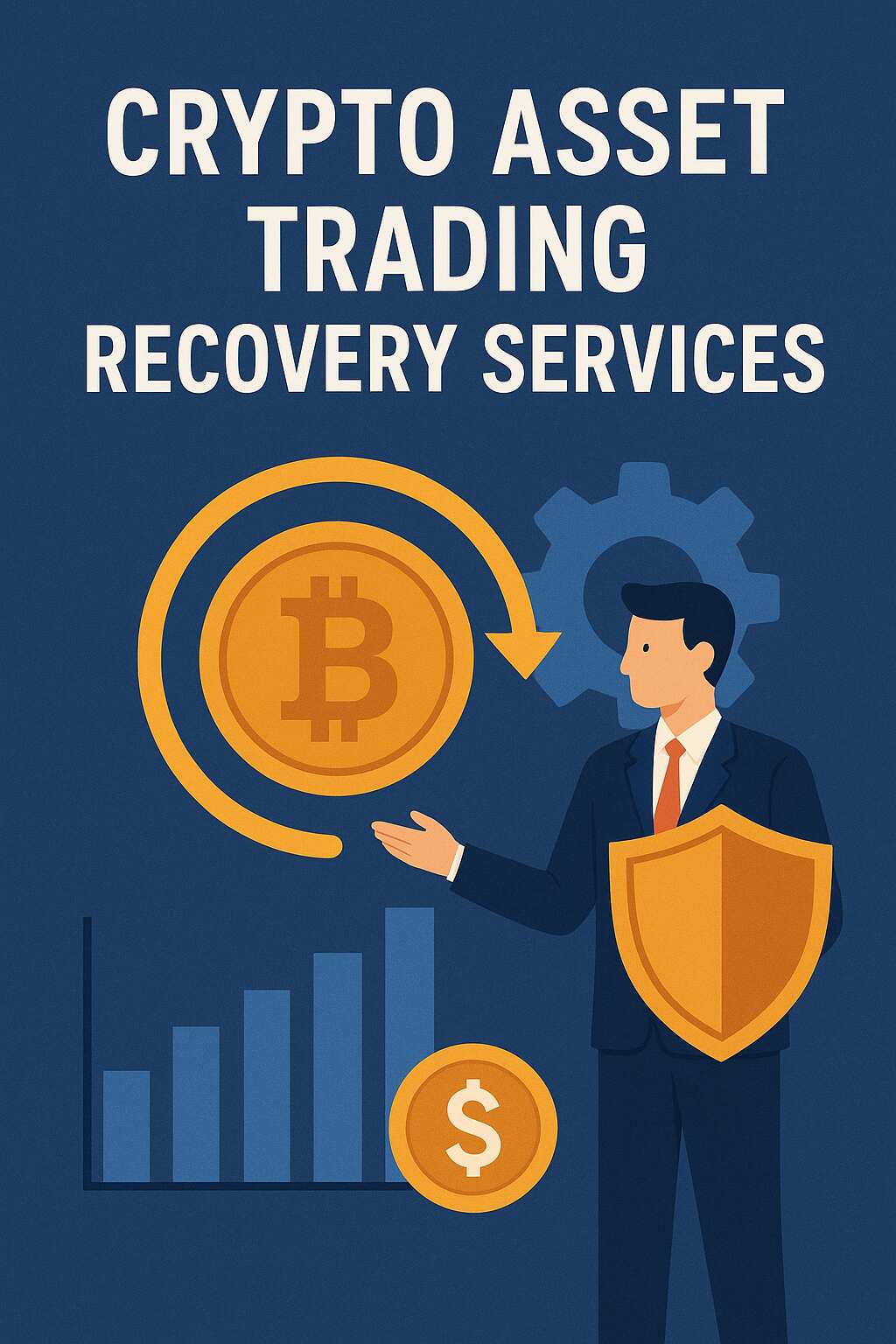The Crypto Trading Recovery Expert: A Professional’s Guide to Legitimacy, Process, and Prevention
The volatile and often unregulated world of cryptocurrency trading is fraught with risk. While significant gains are possible, so too are devastating losses. These losses aren’t always due to market downturns; a growing number stem from sophisticated scams, exchange hacks, user error, or compromised security.
In the wake of such events, a niche and often misunderstood profession has emerged: the crypto trading recovery expert. This article provides a professional overview of what these experts do, how to identify legitimate services, and, most importantly, how to prevent the need for one.
Who is a Crypto Trading Recovery Expert?
A crypto trading recovery expert is a professional or firm specializing in assisting individuals and businesses in recovering lost or stolen cryptocurrency assets. Their work is not about recovering funds lost due to poor trading decisions but rather those lost due to:
-
Phishing Scams: Where users are tricked into revealing private keys or exchange login credentials.
-
Romance Scams (Pig Butchering): Long-term cons where victims are persuaded to send crypto to fraudulent platforms.
-
Fake Investment Platforms: Ponzi schemes or fraudulent trading sites that disappear with users’ deposits.
-
Exchange Hacks: Although recovery here is often handled by the exchange itself, experts may assist with legal proceedings.
-
User Error: Such as sending funds to an incorrect wallet address (though this is often irreversible).
The Toolkit: How Do Recovery Experts Operate?
Legitimate recovery experts employ a multi-faceted approach, combining technical knowledge with legal and investigative skills. Their process typically involves:
-
Case Assessment: The expert first conducts a thorough analysis to determine the nature of the loss and the likelihood of recovery. They will request all relevant details, including transaction IDs (TXID), wallet addresses, communication with scammers, and any other evidence.
-
Blockchain Investigation and Tracing: Using advanced blockchain analytics tools (e.g., Chainalysis, CipherTrace), experts trace the movement of stolen funds. Cryptocurrency transactions are permanent and public, allowing experts to follow the money as it moves between wallets, through mixers (tumblers), and often into centralized exchanges.
-
Engagement with Exchanges: Once funds are traced to a wallet controlled by a regulated cryptocurrency exchange, a recovery expert can formally contact that exchange’s security and compliance team. They present their evidence to prove the funds were stolen. The exchange can then freeze the assets and, if compelled by a court order, potentially return them.
-
Legal Collaboration: Recovery is rarely a purely technical process. Reputable experts work in tandem with legal counsel to obtain the necessary court orders, injunctions, and subpoenas required to legally seize and repatriate funds from exchanges or other third parties.
-
Negotiation and Asset Seizure: In some cases, experts may directly engage with the perpetrators, using their traced evidence as leverage to negotiate a return of funds, though this is less common.
A Critical Warning: Navigating the Minefield of Recovery Scams
Tragically, the desperation of victims makes them prime targets for a second wave of scams. The field is rife with fraudulent “recovery experts.” Here’s how to identify legitimate professionals and avoid recovery scams:
Red Flags of a Recovery Scam:
-
Guaranteed Success: No legitimate expert can guarantee recovery. The complex nature of blockchain theft makes outcomes uncertain.
-
Upfront Payment Requests: Be extremely wary of anyone demanding large fees before any service is rendered. Legitimate firms often work on a contingency fee basis (a percentage of the recovered assets) or require a retainer only after a clear plan is established.
-
Pressure Tactics: Scammers will create a false sense of urgency, pressuring you to act quickly without doing due diligence.
-
Communication via Social Media DM/Telegram: Legitimate, professional firms do not operate primarily through unsolicited DMs on Twitter, Instagram, or Telegram.
-
Requests for Private Keys or Funds: A true expert will NEVER ask for your private keys, seed phrases, or ask you to send crypto to them to “verify” your wallet or facilitate recovery.
Hallmarks of a Legitimate Service:
-
Transparent Fee Structure: Clear explanation of costs, often contingency-based.
-
Professional Background: A verifiable team with profiles on LinkedIn, a professional website, and a history in cybersecurity, law enforcement, or legal fields.
-
No Promises, Only a Process: They provide a realistic assessment of your case and a clear explanation of their investigative and legal process.
-
Confidentiality Agreement: They operate under a formal engagement contract.
The Best Strategy: Proactive Prevention
The most effective recovery strategy is to never need one. Professional traders and investors prioritize security:
-
Use Hardware Wallets: Store large amounts in cold storage (e.g., Ledger, Trezor) disconnected from the internet.
-
Enable Robust Security: Use two-factor authentication (2FA) on all exchanges, but avoid SMS-based 2FA. Use an authenticator app or a security key.
-
Verify Everything: Double-check URLs, wallet addresses, and platform legitimacy. Be skeptical of offers that seem too good to be true.
-
Educate Continuously: Stay informed about the latest phishing tactics and scam trends.
Conclusion
A legitimate crypto trading recovery expert acts as a specialized digital private investigator and legal liaison, leveraging blockchain transparency to track and potentially reclaim stolen assets. While they offer a valuable service in a dire situation, their field is polluted by bad actors seeking to exploit victims a second time.

Crypto Asset Trading Recovery Services: A Professional Guide to Legitimacy, Process, and Risk Mitigation
Crypto Trading Recovery Expert: The decentralized and often irreversible nature of cryptocurrency transactions, while a cornerstone of the technology’s value proposition, presents a significant challenge when things go wrong. Billions of dollars in crypto assets are lost annually not to market volatility, but to sophisticated scams, operational errors, and security breaches. In response, a specialized industry has emerged: Crypto Asset Trading Recovery Services.
This article provides a professional examination of these services, outlining what they are, how they operate, the critical distinctions between legitimate firms and recovery scams, and the paramount importance of prevention.
Defining the Service: What Are Crypto Asset Trading Recovery Services?
Crypto Asset Trading Recovery Services are professional firms or consultancies that specialize in investigating and attempting to recover digital assets that have been lost or stolen due to non-market events. It is crucial to understand that these services do not recover funds lost from poor trading decisions or market downturns. Their expertise lies in addressing losses caused by:
-
Cyber Fraud and Scams: Including phishing attacks, fake initial coin offerings (ICOs), “pig butchering” (Sha Zhu Pan) romance scams, and fraudulent investment platforms.
-
Theft and Hacks: Recovery of assets stolen from individual wallets or compromised exchange accounts.
-
Operational and Transactional Errors: Most commonly, funds sent to an incorrect or incompatible blockchain address (though recovery is often impossible here).
-
Ransomware Attacks: Assisting organizations in tracking and, in some cases, recovering funds paid to ransomware actors.
-
Custodial Issues: Disputes or insolvencies involving cryptocurrency exchanges or other third-party custodians.
The Professional Recovery Framework: How Legitimate Services Operate
Reputable recovery firms do not possess a “magic key” to reverse blockchain transactions. Instead, they employ a meticulous, multi-disciplinary approach that blends technical investigation with legal action.
-
Initial Consultation and Triage: The process begins with a detailed forensic intake. The firm will require comprehensive evidence, including transaction hashes (TXID), relevant wallet addresses, all communication with perpetrators, and exchange account details. This phase is used to assess the feasibility of recovery and set realistic client expectations.
-
Blockchain Forensic Analysis: Using advanced blockchain analytics software (e.g., Chainalysis, Elliptic, CipherTrace), investigators trace the flow of stolen funds. While transactions are pseudonymous, this analysis can identify patterns, cluster addresses to specific entities, and follow the movement of assets as they are laundered through mixers or into regulated exchanges.
-
Engagement with Virtual Asset Service Providers (VASPs): A core function of recovery is acting as a liaison. When traced funds land in an account at a regulated exchange (a VASP like Coinbase or Binance), the recovery firm formally engages the exchange’s security and compliance team. They present a compelling evidence package to prove the assets were stolen.
-
Legal and Law Enforcement Collaboration: Recovery is often a legal process. Legitimate firms work in concert with legal counsel to obtain civil court orders, injunctions, or criminal seizure warrants. This legal pressure is frequently necessary to compel a VASP to freeze and eventually repatriate the identified assets. They also assist clients in properly reporting the crime to relevant law enforcement agencies (e.g., FBI, IC3).
-
Asset Seizure and Repatriation: Upon successful legal action and cooperation from the VASP, arrangements are made for the seized assets to be returned to their rightful owner.
A Critical Disclaimer: The Pervasive Threat of Recovery Scams
The desperation of victims makes them highly vulnerable to secondary fraud. The space is unfortunately saturated with fraudulent actors posing as recovery experts. Extreme caution is required.
Identifying Red Flags:
-
Unsolicited Offers: Legitimate firms do not proactively contact victims via social media DMs, Telegram, or email.
-
Guarantees of Success: No ethical service can promise recovery; the process is inherently uncertain.
-
Demand for Upfront Fees: Be highly suspicious of any request for large payments before any service is performed. Authentic firms often work on a contingency fee model (a percentage of recovered assets) or a transparent retainer-after-assessment basis.
-
Requests for Private Keys or Sensitive Information: A true professional will never ask for your private keys, seed phrases, or passwords.
-
Pressure Tactics: Scammers create artificial urgency to prevent you from conducting due diligence.
Hallmarks of a Legitimate Firm:
-
Transparent Fee Structure: Clear, written agreements outlining costs, which are often contingent on success.
-
Verifiable Credentials: A professional team with backgrounds in cybersecurity, law enforcement, finance, or legal services, with publicly available profiles on platforms like LinkedIn.
-
Professional Communication: Official company channels, a professional website, and a focus on client education and realistic outcomes.
-
Clear Contract: A detailed engagement letter that outlines the scope of work, responsibilities, and fees.
The Superior Strategy: Proactive Risk Management and Prevention
While recovery services serve a vital purpose, the most effective strategy is to avoid the need for them entirely. Institutional and individual investors must prioritize security:
-
Robust Custody Solutions: Utilize hardware wallets for significant asset storage and ensure proper key management hygiene (e.g., multi-signature setups, secure seed storage).
-
Enhanced Security Protocols: Mandate the use of hardware security keys (YubiKey) or authenticator apps for 2FA on all exchanges and wallets; disable SMS-based 2FA.
-
Comprehensive Education: Continuously train yourself and your team on the latest phishing tactics and social engineering schemes.
-
Verification Procedures: Implement strict processes for verifying wallet addresses and transaction details before authorizing any transfer.
Conclusion
Crypto Asset Trading Recovery Services fill a critical gap in the digital asset ecosystem, offering a pathway to potential restitution for victims of fraud and theft. Their work, grounded in blockchain forensics and legal collaboration, provides a necessary service where the technology’s immutability is a drawback.

The Crypto Trading Scam Recovery Expert: Navigating the Path to Potential Restitution
Crypto Trading Recovery Expert: The explosive growth of the cryptocurrency market has been a beacon for innovation and investment. Unfortunately, it has also attracted a dark element: sophisticated and pervasive scams. From “pig butchering” schemes to fraudulent exchanges and fake investment platforms, billions of dollars are stolen from investors annually. In the devastating aftermath of such theft, a specific professional has emerged: the Crypto Trading Scam Recovery Expert.
This article provides a professional overview of this niche field, explaining the role of these experts, the methodologies they employ, and the critical steps for distinguishing legitimate professionals from the secondary scammers who prey on victims.
Understanding the Role: More Than Just a Tech Whiz
A Crypto Trading Scam Recovery Expert is not a single individual but often represents a specialized firm comprising professionals with backgrounds in:
-
Blockchain Forensics
-
Cybersecurity
-
Law and Compliance
-
Law Enforcement (former officials)
Their primary role is to assist individuals and businesses who have lost crypto assets to fraudulent activity—not market losses—by investigating the theft and attempting to recover the funds. Their targets are scams like:
-
Pig Butchering (Sha Zhu Pan): Long-term romance scams that build trust before funneling victims to fraudulent trading sites.
-
Phishing Attacks: Theft of private keys or exchange login credentials.
-
Fake Exchanges and Investment Platforms: Ponzi schemes that disappear after collecting user deposits.
-
Impersonation and Social Engineering: Scams where individuals are tricked into sending funds directly to a scammer’s wallet.
The Recovery Process: A Multi-Disciplinary Approach
Recovery is not about “reversing” a blockchain transaction—which is immutable—but about leveraging its transparency to track and legally seize assets.
-
Initial Case Assessment & Forensic Intake: The process begins with a detailed evidence collection. The expert will require all transaction IDs (TXIDs), wallet addresses, screenshots of communications, and any other relevant data. This helps determine the feasibility of recovery and sets realistic expectations.
-
Blockchain Investigation and Tracing: Using advanced blockchain analytics tools (e.g., Chainalysis, Elliptic), experts trace the path of the stolen funds. Every transaction is recorded on the public ledger, allowing them to follow the money as it moves between wallets, through mixing services (tumblers), and, crucially, into centralized cryptocurrency exchanges (CEXs).
-
Engagement with Virtual Asset Service Providers (VASPs): This is often the most critical step. When stolen funds are traced to an account on a regulated exchange (like Coinbase, Binance, or Kraken), the recovery expert acts as a professional liaison. They present a comprehensive evidence package to the exchange’s security and compliance team to prove the assets were stolen from their client.
-
Legal Collaboration and Enforcement: Recovery experts work hand-in-hand with legal counsel. Lawyers can obtain court orders, injunctions, or seizure warrants based on the evidence gathered. This legal pressure is frequently necessary to compel an exchange to formally freeze and eventually repatriate the stolen funds to the victim. They also assist in properly filing reports with law enforcement agencies like the FBI’s IC3.
-
Asset Seizure and Repatriation: Upon successful legal action and cooperation from the VASP, procedures are initiated to return the funds.
A Paramount Warning: The Epidemic of Recovery Scams
Desperation makes scam victims prime targets for a second wave of fraud. A vast number of entities advertising “recovery services” are, in fact, scams themselves.
How to Spot a Recovery Scam (Red Flags):
-
Unsolicited Contact: Legitimate experts do not proactively reach out via Twitter DMs, Telegram, or Instagram comments.
-
Guaranteed Results: No one can guarantee the recovery of stolen crypto. This is a definitive sign of a scam.
-
Demand for Upfront Fees: A request for payment before any service is rendered is a major red flag. Ethical firms often work on a contingency fee basis (a percentage of recovered assets) or a clear, transparent retainer model after assessment.
-
Requests for Private Keys or Secret Phrases: A genuine expert will NEVER ask for this information. Anyone who does is attempting to steal your remaining assets.
-
Pressure Tactics: Scammers create a false sense of urgency to prevent you from doing due diligence.
Hallmarks of a Legitimate Recovery Expert:
-
Transparent Fee Structure: Clear, written agreements explaining costs, often contingent on success.
-
Professional Credentials: A verifiable team with LinkedIn profiles, backgrounds in relevant fields, and a professional website.
-
No Promises, Only a Process: They provide a realistic assessment and a clear explanation of their investigative and legal strategy.
-
Confidentiality: They operate under a formal non-disclosure agreement (NDA) and engagement contract.
The Best Defense is Prevention
While recovery experts provide a crucial service, the best strategy is to avoid being scammed in the first place.
-
Education: Stay informed about common crypto scams.
-
Security: Use hardware wallets for storage and enable strong, non-SMS 2FA on all exchange accounts.
-
Skepticism: Be highly wary of “too good to be true” investment returns and unsolicited investment advice online.
-
Verification: Always double-check URLs, wallet addresses, and the legitimacy of any platform.
Conclusion
A legitimate Crypto Trading Scam Recovery Expert provides a vital lifeline, combining technical blockchain expertise with legal acumen to navigate the complex process of asset recovery. They offer a path to potential restitution where few options exist.

Identifying the Best Recovery Expert for Cryptocurrency Trading Losses: A Professional Guide
Crypto Trading Recovery Expert: The promise of high returns in cryptocurrency trading is often shadowed by significant risks, including sophisticated scams, exchange hacks, and irreversible user errors. For victims who have lost funds to fraud, the search for a solution frequently leads to one question: Who is the best recovery expert for cryptocurrency trading losses?
This article provides a professional framework for evaluating and selecting a recovery service, emphasizing that the “best” choice is not a single entity but the firm that is most legitimate, transparent, and suited to your specific case.
Defining “Best”: Criteria for a Legitimate Recovery Expert
The “best” recovery expert is not defined by flashy marketing or false promises. Instead, they are distinguished by their professionalism, methodology, and ethical standards. Key criteria include:
-
Proven Expertise and Credentials: The ideal firm employs professionals with verifiable backgrounds in blockchain forensics, cybersecurity, financial law, and/or law enforcement. Look for a team with public profiles on professional networks like LinkedIn and a history of work in relevant fields.
-
Transparent and Realistic Communication: A reputable expert will never guarantee success. They will provide a candid initial assessment of your case, outlining the challenges and potential pathways without making unrealistic promises. They set clear expectations from the outset.
-
A Robust and Multi-Disciplinary Process: The best firms don’t rely on a single tactic. They employ a comprehensive strategy that includes:
-
Blockchain Forensic Analysis: Using tools like Chainalysis or Elliptic to trace the flow of stolen funds.
-
Legal Collaboration: Working with attorneys to obtain court orders and injunctions.
-
Liaison with Exchanges: Formally engaging with compliance departments at regulated Virtual Asset Service Providers (VASPs) to freeze and recover assets based on evidence.
-
-
Ethical Fee Structure: Be highly wary of any service demanding large upfront fees. The most reputable operators typically work on a contingency fee basis, meaning their compensation is a pre-agreed percentage of the successfully recovered assets. This aligns their interests with yours. Some may charge a reasonable retainer for the initial investigation but should be transparent about all costs.
The Hallmarks of the Best: What to Look For
When vetting potential recovery experts, prioritize firms that demonstrate the following:
-
Professionalism: They have a professional website, official contact information, and secure channels for communication. They do not operate primarily through Telegram, WhatsApp, or social media DMs.
-
Confidentiality: They are willing to sign a Non-Disclosure Agreement (NDA) to protect your sensitive information.
-
Clear Contract: They provide a detailed engagement letter that explicitly outlines the scope of services, the fee structure, and the responsibilities of both parties.
-
Educational Focus: They take the time to explain the process, the role of blockchain analysis, and the legal mechanisms involved, empowering you as a client.
Major Red Flags: How to Spot a Recovery Scam
The desperate search for help makes victims easy targets for a second layer of fraud. The “worst” recovery services are scams themselves. Avoid any entity that exhibits these red flags:
-
Unsolicited Offers: Legitimate firms do not proactively contact you via direct message on Twitter, Instagram, or Telegram. This is the #1 tactic of scammers.
-
Guaranteed Success: Any promise of a 100% recovery rate is a definitive lie. Recovery is a complex and uncertain process.
-
Demand for Upfront Payment: Requests for substantial fees before any work has begun are a major warning sign.
-
Requests for Private Keys or Seed Phrases: A genuine expert will never, under any circumstances, ask for this information. Anyone who does is attempting to steal your remaining assets.
-
Pressure Tactics: Creating a sense of urgency to prevent you from researching their company or consulting with others is a classic scammer tactic.
Prevention: The Ultimate “Best” Strategy
While knowing how to find a good recovery expert is crucial, the best strategy is to avoid the need for one entirely.
-
Secure Storage: Use a hardware wallet for storing significant amounts of cryptocurrency.
-
Iron-Clad Security: Enable strong two-factor authentication (2FA) using an authenticator app, not SMS, on all exchange and wallet accounts.
-
Due Diligence: Thoroughly research any trading platform, investment opportunity, or individual before sending funds.
-
Skepticism: Be inherently skeptical of offers that seem too good to be true, as they almost always are.
Conclusion
There is no single “best” recovery expert for everyone. The best choice is a legitimate, professional firm whose expertise aligns with your specific situation and whose practices are transparent and ethical. This decision requires diligent research and a healthy dose of skepticism.

Free Crypto Trading Recovery Services: Separating Hope from Reality
Crypto Trading Recovery Expert: The devastating experience of losing cryptocurrency to a scam or theft often leaves victims feeling desperate and vulnerable. In the frantic search for a solution, the promise of “free crypto trading recovery services” can appear as a beacon of hope. However, in the vast majority of cases, this offer is a dangerous mirage designed to exploit victims a second time.
This article provides a professional and critical examination of this concept, explaining why truly free, legitimate recovery services are exceedingly rare and how to identify the predatory scams that dominate this space.
The Business Reality: Why Professional Recovery is Rarely Free
Recovering stolen cryptocurrency is a complex, resource-intensive process that requires highly specialized skills. Legitimate firms employ experts in:
-
Blockchain Forensics: Utilizing expensive software subscriptions (e.g., Chainalysis, Elliptic) to trace stolen funds.
-
Legal Counsel: Working with attorneys to obtain court orders and injunctions, which incurs significant legal fees.
-
Investigation: Dedicating countless hours to case analysis, evidence gathering, and liaison with law enforcement and exchanges.
Given these high operational costs, it is not economically viable for a legitimate business to offer this service for free. They must generate revenue to sustain their operations, typically through one of two models:
-
Contingency Fee: A pre-agreed percentage of the successfully recovered assets. This aligns the firm’s incentive with the client’s success.
-
Retainer Model: An upfront fee to begin the investigation, often followed by additional costs for legal proceedings.
Any offer that deviates from these standard business models should be treated with extreme skepticism.
The Lure of “Free”: A Classic Scam Tactic
The offer of “free” recovery services is almost exclusively a tactic used by scammers. Their goal is to lure in desperate victims to perpetrate a secondary scam. The approach typically follows these steps:
-
The Hook: Scammers identify recent victims through social media posts (e.g., Twitter, Reddit) or blockchain explorers where large thefts are visible. They make contact via direct message, offering their “free” services.
-
The Illusion of Legitimacy: To build trust, they may use official-sounding language, fake testimonials, or even impersonate real law enforcement agencies or security firms.
-
The Bait-and-Switch: After gaining the victim’s trust, the “free” service inevitably reveals a hidden cost. This can be framed as:
-
“Refundable” Upfront Fees: A request for a payment to “cover administrative costs” or to “post a bond,” with a false promise of reimbursement.
-
“Software” or “Wallet Verification”: The victim is asked to send a small amount of cryptocurrency to a specific wallet to “verify ownership,” “activate tracking software,” or “pay network fees” for the recovery. This is a direct theft.
-
Access Request: They may ask for remote access to your computer to “install recovery tools” or, most dangerously, for your private keys or seed phrase to “facilitate the transfer.”
-
Red Flags: How to Identify a Recovery Scam
Be acutely aware of these warning signs, which are universal among fraudulent “free” services:
-
Unsolicited Contact: Legitimate firms do not proactively DM victims on social media.
-
Guarantees of 100% Success: Recovery is never certain.
-
Pressure to Act Quickly: Scammers create false urgency to prevent you from thinking critically or seeking advice.
-
Vague Process Details: They cannot clearly explain their methodology because they don’t have one.
-
Requests for Private Information: No legitimate service will ever ask for your private keys, seed phrases, or passwords.
Are There Any Legitimate Free Options?
While private, for-profit free services are a myth, there are official channels that victims should pursue which do not require payment:
-
Report to Law Enforcement: File a detailed report with your local police department and the relevant cybercrime unit in your country (e.g., the FBI’s Internet Crime Complaint Center – IC3 in the U.S.). While they cannot guarantee recovery, they are the official authority for investigating such crimes. This is genuinely free.
-
Report to the Exchange Involved: If you sent funds to a scammer’s wallet on a regulated exchange (e.g., Binance, Coinbase), immediately file a report with that exchange’s support and security team. Provide the transaction hash and all evidence. Their compliance team may be able to freeze the assets if they are still on the platform. This is also a free service.
These avenues have no upfront cost and are the correct first steps for any victim. However, they are not “recovery services” in the active, hands-on sense that private firms offer.
Conclusion: A Hard Truth and the Path Forward
The concept of a professional, effective, and free crypto trading recovery service is, for all practical purposes, a contradiction. It is a narrative almost entirely crafted by scammers to exploit vulnerability.
The path to potential recovery lies in managing expectations and taking correct, secure actions:
-
Abandon the search for “free” help from private entities; it is a trap.
-
Immediately report the crime to official law enforcement and the relevant exchanges.
-
If you seek private assistance, only engage with firms that are transparent about their fees (preferably contingency-based) and have verifiable credentials and a clear, professional process.

Free Crypto Trading Recovery Services





